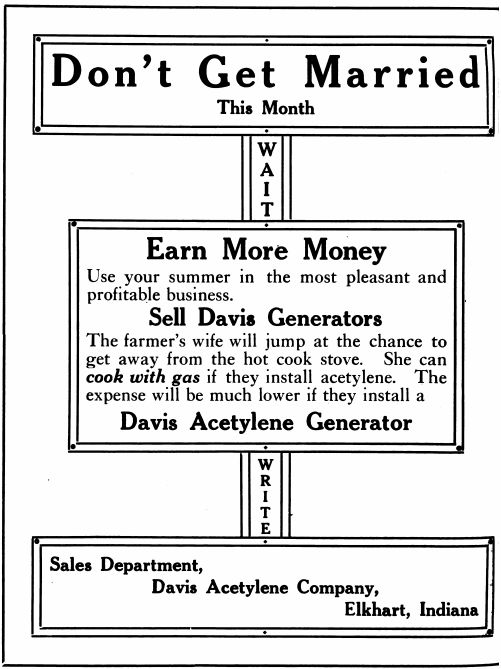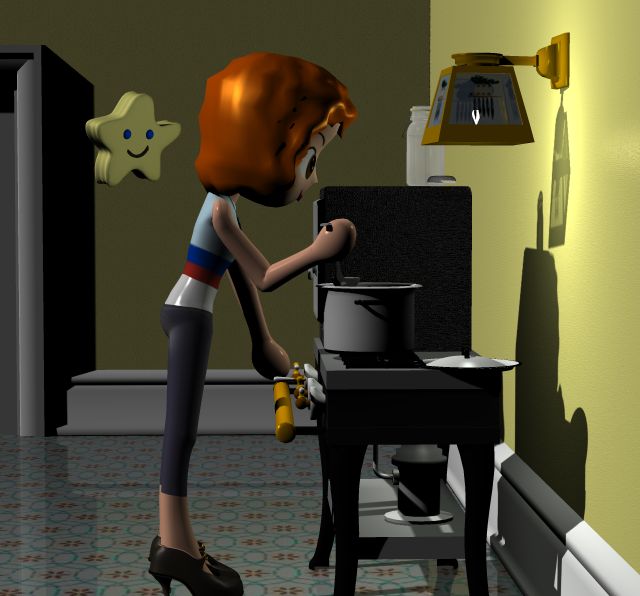Monday, January 27, 2020
Good advice
I noted before that acetylene couldn't compete with electricity in urban or automotive uses, but it should have done better in off-grid and emergency situations.
An ad from 1912 Acetylene Journal tries to sell acetylene to farmers.
 [An interesting piece of typesetting art, using slugs and rules and blocks to pull your eyes in two directions. You could turn it into a dynamic neon sign.]
The ad was good advice to the young salesman, and he would be offering good advice to the farm wife.
Electricity didn't arrive at most farms until after WW2, so the choices were coal, wood, kerosene or acetylene. Among those four, acetylene was the safest and cleanest and coolest. A wood or coal range is always hot and always consuming fuel. Kerosene is smelly and greasy and dangerous. Acetylene is inert until you turn the valve to let water drip on the carbide. Then you can open the burner valve and light the burner.
The generator took some maintenance, filling the carbide in the morning and emptying out the limestone after it was done, but the process was no worse than coal or wood ashes. The leftover material is slaked lime or hydrated lime, usable as aggregate in concrete, and a good fertilizer.
[An interesting piece of typesetting art, using slugs and rules and blocks to pull your eyes in two directions. You could turn it into a dynamic neon sign.]
The ad was good advice to the young salesman, and he would be offering good advice to the farm wife.
Electricity didn't arrive at most farms until after WW2, so the choices were coal, wood, kerosene or acetylene. Among those four, acetylene was the safest and cleanest and coolest. A wood or coal range is always hot and always consuming fuel. Kerosene is smelly and greasy and dangerous. Acetylene is inert until you turn the valve to let water drip on the carbide. Then you can open the burner valve and light the burner.
The generator took some maintenance, filling the carbide in the morning and emptying out the limestone after it was done, but the process was no worse than coal or wood ashes. The leftover material is slaked lime or hydrated lime, usable as aggregate in concrete, and a good fertilizer.
 Why did acetylene fail in this application? Still mysterious. Maybe the young salesman married the farmer's daughter.
Why did acetylene fail in this application? Still mysterious. Maybe the young salesman married the farmer's daughter.
 [An interesting piece of typesetting art, using slugs and rules and blocks to pull your eyes in two directions. You could turn it into a dynamic neon sign.]
The ad was good advice to the young salesman, and he would be offering good advice to the farm wife.
Electricity didn't arrive at most farms until after WW2, so the choices were coal, wood, kerosene or acetylene. Among those four, acetylene was the safest and cleanest and coolest. A wood or coal range is always hot and always consuming fuel. Kerosene is smelly and greasy and dangerous. Acetylene is inert until you turn the valve to let water drip on the carbide. Then you can open the burner valve and light the burner.
The generator took some maintenance, filling the carbide in the morning and emptying out the limestone after it was done, but the process was no worse than coal or wood ashes. The leftover material is slaked lime or hydrated lime, usable as aggregate in concrete, and a good fertilizer.
[An interesting piece of typesetting art, using slugs and rules and blocks to pull your eyes in two directions. You could turn it into a dynamic neon sign.]
The ad was good advice to the young salesman, and he would be offering good advice to the farm wife.
Electricity didn't arrive at most farms until after WW2, so the choices were coal, wood, kerosene or acetylene. Among those four, acetylene was the safest and cleanest and coolest. A wood or coal range is always hot and always consuming fuel. Kerosene is smelly and greasy and dangerous. Acetylene is inert until you turn the valve to let water drip on the carbide. Then you can open the burner valve and light the burner.
The generator took some maintenance, filling the carbide in the morning and emptying out the limestone after it was done, but the process was no worse than coal or wood ashes. The leftover material is slaked lime or hydrated lime, usable as aggregate in concrete, and a good fertilizer.
 Why did acetylene fail in this application? Still mysterious. Maybe the young salesman married the farmer's daughter.
Why did acetylene fail in this application? Still mysterious. Maybe the young salesman married the farmer's daughter.Labels: 1901, Patient things
